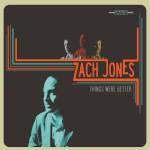Better and Better
Zach Jones gets all Smokey and Wonder-ous
Isn’t Zach Jones a guitar player? He certainly was with Rocktopus/As Fast As, on his following two solo records, and as a sideman for the likes of Pete Kilpatrick and Aaron Lee Marshall and Amy Allen [this originally ran in June of 2012]. A sinewy and smart guitar player, actually, with subtle tone and great instincts.
 And yet, on the brand-new Things Were Better, it would appear he doesn’t play a single note, handing off guitar duties to the likes of Max Cantlin (Fogcutters/Anna & the Diggs, etc.) and Anthony Drouin (Lady Zen’s backing band, the Lazy Suzans, etc.), so that he can focus solely on lead vocals. He has reimagined/recreated himself here as a 1960s soul singer, a la Smokey Robinson with the Miracles, and it is really easy on the ears.
And yet, on the brand-new Things Were Better, it would appear he doesn’t play a single note, handing off guitar duties to the likes of Max Cantlin (Fogcutters/Anna & the Diggs, etc.) and Anthony Drouin (Lady Zen’s backing band, the Lazy Suzans, etc.), so that he can focus solely on lead vocals. He has reimagined/recreated himself here as a 1960s soul singer, a la Smokey Robinson with the Miracles, and it is really easy on the ears.
Or better yet, Stevie Wonder’s break-through record, the precocious and infectious Up-Tight, where Stevie went from child prodigy to songwriter and soul-singer. Jones shoots for the moon, with falsetto and drive and a terrific mix of easy soul and just plain good times.
The opening and title track, especially, is a keeper. Penned by Jon Nolan, who recorded the album at his Milltown Studios and did just about everything right in getting the organic sound this record needed, “Things Were Better” fires up with a guitar tone like walking barefoot onto the back lawn on a warm summer night and when Jones’ vocals enter he’s so fucking charming I was hoping he’d offer to buy me a drink. Then it gets better. The pacing is terrific, somehow both a rave-up and relaxed, with a sense of urgency and real passion, but nothing forced. It’s deep-seated. Enough so that “I need you like a bird needs feathers” doesn’t sound remotely corny. There are classic Motown “yeeea-aaah” guttural wails and sax duets from Kyle Hardy and Brian Graham and I’m pretty sure Bryan Brash and Tim Garrett chime in with viola and cello at one point or another.
It’s a listen-10-times-in-a-row kind of song.
In the same way that Aloe Blacc couldn’t hope to sustain the intensity of “I Need a Dollar” for the whole of Good Things, however, not every song here is that terrific. “If You Don’t Care” feels like an idea that didn’t completely come together, a ballad without resolution. “Wish I Could Dance,” despite being a hell of a lot of fun, comes off a tad anachronistic, a song that lives in a sitcom. In the same way Kurt Baker performs – okay, lives – in a pure-pop alternate universe and the Tricky Britches still write train songs in black and white, Jones is taking us outside of our everyday existences by conjuring a shimmering past that reminds us (maybe for the first time) of what used to be.
“Hard to Get” is a sugar-pie-honey-bunch number where the piano is mixed excellently to the center of the left channel, commanding your attention, but not stealing the spotlight. “Just out of Reach” teams Jones with Anna Lombard, like Otis Redding with Carla Thomas (that King & Queen is not on iTunes is a shame), a song with give and take and a playful sexuality.
Don’t sleep on “All the Time,” either. Kate Beever butters you up with the high end of the vibraphone before she’s joined by a skittering drum beat from Christopher Sweet. There’s just a tad of classic rock here, maybe coming from Tyler Quist’s active bass.
Best of all, though, is when Jones cracks open his chest and deals it straight. He has enough backlog with us now that we care – at least I do – about the mistakes that “have helped me learn from myself,” which fill the melancholic “Bittersweet Melody.” Too, when Jones rephrases Dylan with his closing “Used To Be So Young,” it’s hard not to think about Stevie Wonder’s take on “Blowing in the Wind,” a cover that said as much about Wonder’s musical acumen as any original.
Jones lets his voice break just a hair on his repeating and finishing delivery of “I used to be so young,” enough to make you believe it. Perhaps, back then, “it always seemed much easier,” but it seems like Jones has managed to figure out a thing or two along the way.


